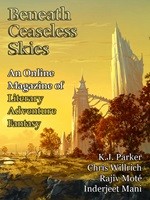 Beneath Ceaseless Skies #417, October 3, 2024
Beneath Ceaseless Skies #417, October 3, 2024
“Nine Tenths of the Law” by K. J. Parker
“To Hunt the Grey Lady” by Chris Willrich
“Black Wine From the Slopes of Dawn” by Rajiv Moté
“The Mausoleum” by Inderjeet Mani
Reviewed by Victoria Silverwolf
In honor of the magazine’s sixteenth anniversary, this special double-sized issue offers four new works of fiction, including a novelette and a novella, instead of the usual pair of short stories.
“Nine Tenths of the Law” by K. J. Parker is narrated by a lawyer in a fantasy world where possession by demons is not uncommon. He and the demon who possesses him work together for their mutual benefit. Because being possessed frees one from all legal responsibility for one’s actions, the demon takes possession of someone who wants to commit murder, thus allowing that person to escape punishment. The lawyer collects a hefty fee and the demon performs her duty of damning the wicked to perdition. When an ambitious clergyman hires the lawyer in order to murder a superior, the situation threatens the lawyer’s career and maybe even his life.
I have supplied a lengthy synopsis in order to demonstrate that this novelette is intricately plotted. It is also written in an informal style that makes it read like hardboiled crime fiction. The cynical lawyer and the cantankerous but surprisingly moralistic demon are an interesting pair, with greater depth of character than one might expect.
The novella “To Hunt the Grey Lady” by Chris Willrich is a seafaring adventure. The narrator is the captain of a pirate vessel, one of many hoping to win a rich reward by returning a living ship to its owner. Upon boarding the sentient vessel, the raiders discover that it has gone mad, and that this delusion affects its crew as well. Complicating matters is the fact that the captain of the insane ship is the narrator’s former lover.
In contrast to the synopsis of Parker’s story, I have greatly oversimplified the complex plot of this one, which contains multiple flashbacks and so many fantasy concepts that I lost track of them. Some of these seem whimsical, such as a giant anthropomorphic rat or wine that makes the drinker sober instead of drunk. Despite the presence of these concepts, and some satiric names for ships, the plot is completely serious. Some readers may thus find the mood inconsistent.
In “Black Wine From the Slopes of Dawn” by Rajiv Moté, a merchant travels to a land of necromancers in order to buy the wine produced there. He samples three different varieties, giving him visions of past, present, and future.
This introspective tale seems intended as an allegory for the changes people experience in life, and for the way things rarely turn out as expected. It ends with a bit of advice from the merchant to a young boy, which could serve as the story’s moral. The author supplies a sufficiently detailed fantasy setting to make the work more than just a simple fable.
The narrator of “The Mausoleum” by Inderjeet Mani labors on the tiling of an intricate tomb for the deceased consort of a king. While working on the difficult problem of tiling the tomb’s central dome, he experiences visions and pays tribute to his dead wife, even though this comes at a very heavy price.
If there is any fantasy content to this story, it is very subtle. The narrator’s visions can be dismissed as hallucinations. The only places mentioned are real ones, and the work can be considered historical fiction. (Unless I am very much mistaken, the mausoleum is similar to the Taj Mahal. Perhaps the story is intended as alternate history.) Although readers may miss the lack of anything overtly supernatural, some may appreciate the story’s discussion of the mathematics of tessellation.
Victoria Silverwolf likes the word “tessellation.”